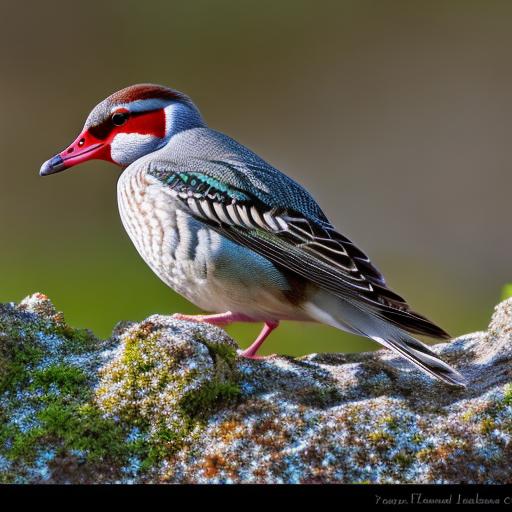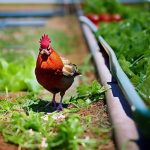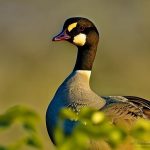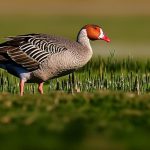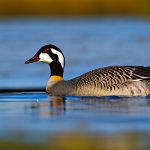Geese have become an increasingly prevalent problem in public spaces, causing a range of issues for both the environment and people. These large birds are known for their aggressive behavior, territorial nature, and prolific breeding habits, which can lead to overpopulation in certain areas. As a result, geese can cause damage to property, create unsightly messes, and pose health risks to humans and other animals.
The negative impact of geese on the environment is significant. Their excessive droppings can contaminate water sources, leading to pollution and the spread of diseases. Additionally, their feeding habits can damage vegetation and disrupt ecosystems. Geese also have a tendency to become aggressive towards humans and other animals, especially during nesting season. This can pose a threat to public safety and limit the enjoyment of public spaces.
Key Takeaways
- Geese in public spaces can be a problem due to their droppings and aggressive behavior.
- Swans can serve as natural deterrents for geese and help control their population.
- Understanding the behavior of both swans and geese is important before introducing swans as a control measure.
- Benefits of using swans include their effectiveness, low maintenance, and aesthetic appeal.
- Factors to consider before using swans include the size of the property, water quality, and potential predators.
The Role of Swans as Natural Deterrents for Geese
One effective solution to control geese in public spaces is the use of swans as natural deterrents. Swans are known for their territorial behavior and can effectively keep geese away from certain areas. They are larger than geese and have a more aggressive nature, which makes them a formidable presence.
Swans are known to establish their territory and defend it vigorously against intruders. When introduced to an area with geese, swans will often chase them away, preventing them from nesting or causing damage. This natural deterrent can be an effective long-term solution for geese control.
Understanding the Behavior of Swans and Geese
To effectively use swans as a deterrent for geese, it is important to understand the behavior of both species. Swans are highly territorial birds that establish their territory through displays of aggression and vocalizations. They will defend their territory against any intruders, including geese.
Geese, on the other hand, are social birds that tend to congregate in large groups. They have a strong instinct to establish nesting sites and will aggressively defend their nests and young. Geese are also known for their honking calls, which they use to communicate with each other and warn of potential threats.
By understanding the behavior of swans and geese, property owners can strategically introduce swans to areas where geese are causing problems. The presence of swans will deter geese from nesting or causing damage, creating a more harmonious environment for both humans and wildlife.
Benefits of Using Swans to Keep Geese Away
There are several benefits to using swans as a means of geese control. Firstly, swans are a natural deterrent that does not require the use of harmful chemicals or physical barriers. This makes them an environmentally friendly option that does not pose any risks to other wildlife or humans.
Secondly, swans can improve the aesthetic value of public spaces. Their graceful presence and elegant appearance can enhance the beauty of parks, lakes, and other recreational areas. Swans are often seen as symbols of beauty and tranquility, adding a touch of elegance to any environment.
Lastly, using swans for geese control can be a long-term solution. Once established in an area, swans will continue to defend their territory against geese, preventing them from returning or causing further damage. This eliminates the need for constant intervention and provides a sustainable solution for geese control.
Factors to Consider Before Using Swans for Geese Control
Before introducing swans to a property for geese control, there are several factors that should be considered. Firstly, it is important to obtain the necessary permits and licenses from local authorities. Some jurisdictions may have specific regulations regarding the introduction of non-native species or the use of animals for pest control.
Secondly, property owners should assess whether their property is suitable for swans. Swans require access to water for swimming and feeding, as well as suitable nesting sites. It is important to provide a habitat that meets their needs and ensures their well-being.
Lastly, property owners should consider the potential impact on other wildlife in the area. Swans can be aggressive towards other bird species, especially during nesting season. It is important to carefully monitor their behavior and intervene if necessary to prevent any harm to other wildlife.
How to Introduce Swans to Your Property

Introducing swans to a property for geese control requires careful planning and preparation. Firstly, it is important to select swans that are suitable for the environment and climate of the area. Different species of swans have different habitat requirements, so it is important to choose the right species for the specific location.
Once the swans have been selected, they should be gradually introduced to the property. This can be done by initially confining them to a small area and gradually expanding their territory over time. This allows the swans to become familiar with their new surroundings and establish their territory without feeling threatened.
It is also important to provide suitable nesting sites for the swans. Swans typically build large nests made of vegetation near bodies of water. Providing nesting materials and ensuring there are suitable locations for nesting will encourage the swans to stay in the area and defend it against geese.
Maintaining a Healthy Environment for Swans and Geese
To ensure the well-being of both swans and geese, it is important to maintain a healthy environment. This includes providing clean water sources for swimming and feeding, as well as suitable vegetation for nesting and feeding.
Regular monitoring of the swans and geese is also important to identify any potential health issues or conflicts between species. If any problems arise, it is important to intervene promptly to prevent any harm or disruption to the birds.
Additionally, property owners should take steps to prevent the overpopulation of geese. This can be done through the use of egg addling programs, which involve removing and treating eggs to prevent them from hatching. This humane method can help control the geese population and reduce the negative impact on the environment.
Alternative Measures to Control Geese
While swans can be an effective long-term solution for geese control, there are alternative measures that can also be considered. One option is the use of physical barriers, such as fences or netting, to prevent geese from accessing certain areas. This method can be effective but may not be suitable for all environments.
Another option is the use of noise deterrents, such as loud noises or predator calls, to scare geese away. This method can be effective in the short term but may lose its effectiveness over time as geese become accustomed to the noise.
Lastly, some property owners may choose to use chemical deterrents to control geese. These chemicals are typically applied to grass or other vegetation and make it unpalatable for geese. However, it is important to use environmentally friendly and safe products to avoid any harm to other wildlife or humans.
Addressing Concerns and Misconceptions about Swans
There are several common concerns and misconceptions about swans that need to be addressed. One concern is that swans are aggressive towards humans. While swans can be territorial and may display aggressive behavior, they generally only become aggressive when they feel threatened or when their nests or young are in danger. By respecting their space and not approaching them too closely, conflicts can be avoided.
Another misconception is that swans are harmful to other wildlife. While swans can be aggressive towards other bird species during nesting season, they generally do not pose a significant threat to other wildlife. By carefully monitoring their behavior and intervening if necessary, conflicts can be minimized.
Lastly, some people believe that swans are difficult to care for and require a lot of maintenance. While swans do require suitable habitat and regular monitoring, they are generally low-maintenance birds. As long as their basic needs are met, they can thrive in a variety of environments.
The Effectiveness of Swans as a Long-Term Solution for Geese Control
In conclusion, the use of swans as a natural deterrent for geese control can be an effective and sustainable solution. By understanding the behavior of both swans and geese, property owners can strategically introduce swans to areas where geese are causing problems. The presence of swans will deter geese from nesting or causing damage, creating a more harmonious environment for both humans and wildlife.
There are several benefits to using swans for geese control, including their natural deterrent capabilities, aesthetic value, and long-term effectiveness. However, it is important to consider the factors that should be taken into account before introducing swans to a property, such as obtaining permits and licenses and providing suitable habitat.
Maintaining a healthy environment for both swans and geese is crucial to their well-being. Regular monitoring and intervention, as well as the prevention of overpopulation, can help ensure their continued presence in public spaces.
While swans can be an effective long-term solution for geese control, there are alternative measures that can also be considered. It is important to carefully evaluate the pros and cons of each method before making a decision.
By dispelling common concerns and misconceptions about swans, property owners can make informed decisions about using swans for geese control. Swans are generally peaceful birds that can coexist with other wildlife when their basic needs are met.
In conclusion, using swans as a natural deterrent for geese control is an effective and environmentally friendly solution that can improve the quality of public spaces. By considering the factors mentioned in this article and taking appropriate measures to maintain a healthy environment, property owners can successfully control geese populations and create a more enjoyable and sustainable environment for all.
If you’re looking for effective ways to keep geese away from your property, you might be interested in an article on Poultry Wizard that discusses the use of swans as a natural deterrent. Swans are known to be territorial and can help keep geese at bay. To learn more about this fascinating technique, check out the article on Poultry Wizard. In addition to this helpful resource, Poultry Wizard also offers articles on other topics such as heaters for chicken coops, A-frame chicken coops, and farmhouse chicken coops.
FAQs
What is the article about?
The article is about using swans to keep geese away.
Why do people want to keep geese away?
Geese can cause damage to property, create a mess with their droppings, and be aggressive towards humans.
How do swans keep geese away?
Swans are territorial and will defend their space against other waterfowl, including geese. The presence of swans can deter geese from entering an area.
Do swans attack humans?
Swans can be aggressive towards humans if they feel threatened or if they are protecting their young. It is important to give swans their space and not approach them too closely.
Can swans and geese coexist peacefully?
In some cases, swans and geese can coexist peacefully. However, if there is limited space or resources, they may compete for these resources and become aggressive towards each other.
Are there any downsides to using swans to keep geese away?
Swans can be expensive to purchase and maintain, and they require a large body of water to live in. Additionally, if the swans are successful in keeping geese away, other waterfowl may also be deterred from entering the area.
Meet Walter, the feathered-friend fanatic of Florida! Nestled in the sunshine state, Walter struts through life with his feathered companions, clucking his way to happiness. With a coop that’s fancier than a five-star hotel, he’s the Don Juan of the chicken world. When he’s not teaching his hens to do the cha-cha, you’ll find him in a heated debate with his prized rooster, Sir Clucks-a-Lot. Walter’s poultry passion is no yolk; he’s the sunny-side-up guy you never knew you needed in your flock of friends!

